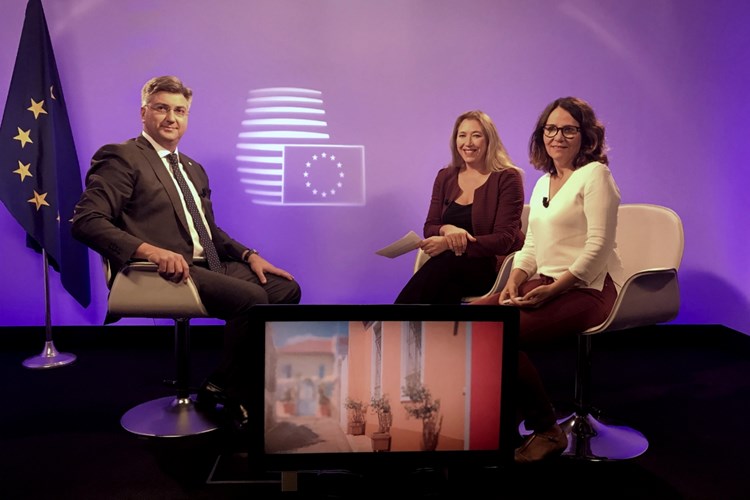- Published: 24.10.2017.
PM: Croatia aims to join Schengen area and euro zone
Croatia has two important goals to achieve -- join the Schengen passport-free travel area and the euro zone, and has made great progress in both areas, Prime Minister Andrej Plenkovic said in an interview with France 24 on Monday.
"Speaking of the Schengen area, Croatia has already done a lot. We have used 120 million euros for strengthening our technical infrastructure and protecting the future external border of the EU. From a political point of view, I think we can be ready for a Council-level decision in the first half of 2019," Plenkovic said.
He said that accession to the Schengen area was one of the pillars of Croatia's European policy, the other being joining the euro zone.
"But first we need to meet the criteria, all the Maastricht criteria, and I think we have made great progress. My government has done an excellent job of reducing the budget deficit, and we also need to reduce public debt. As for the time frame of 2022/2023, I would be very pleased with it," the PM said.
Asked if he advocated deeper integration of the EU and if Croatia wanted to participate in it, Plenkovic said that the EU needed a single agenda and guidelines to deal with key issues.
"We have about 19 months before the next elections for the European Parliament in 2019. As we have agreed in Tallinn, we need one agenda, guidelines, a programme on how to deal with key issues, without going into theoretical discussions on institutional issues, but to see what we can get from what the Treaty allows to do, from our policies and from our budget resources," the Croatian prime minister said, citing problems relating to migration, security, terrorism and the functioning of the Schengen regime.
"We should also see how to resolve major economic and social issues, and design a budget for the next five years in such a way as to facilitate employment and help young people, small and medium businesses," he added.
Plenkovic said his government had responded well to all the crises it had faced, adding that it needed to continue working on structural reforms and try to stay in the group of countries that support closer EU integration.
Asked about the migration crisis and the opposition of the Visegrad Group to the present EU policy in that regard, notably the quota system, Plenkovic said that "countries in central and eastern Europe do not have the same social fabric" as western countries. "They don't have many foreigners and this then becomes a cultural issue. (...) Perhaps they should meet half way so that both sides are satisfied."
He noted that small countries like Croatia, which are not as powerful and influential as large member states, could contribute by participating in efforts to resolve that issue and by showing responsibility and solidarity.
Asked about Agrokor, the PM said that the government had been concerned about the possible collapse of the largest food and retail corporation in Croatia. "We have passed a law introducing emergency administration for up to 15 months for the purpose of financial and business restructuring. I think we did a good thing, the corporation continues to operate. (...) An agreement needs to be reached among creditors in the next nine months. So far we have managed to ensure that the case is not affecting the positive macroeconomic indicators: the GDP growth and the fall in unemployment," he said.
Speaking of the situation in Spain and Catalonia's efforts to gain full independence, Plenkovic said that Croatia shared the concern of EU governments, stressing the importance of finding a peaceful solution through dialogue between Madrid and Barcelona within the Spanish constitutional framework.
Asked what he thought of Prime Minister Mariano Rajoy's decision to trigger Article 155 of the Constitution and suspend Catalan autonomy, Plenkovic said that this was "the choice of the Spanish government".
"But what is important for us as colleagues and Europeans is to seek a solution through dialogue and understanding each other," he added.
Plenkovic said he was not worried about the increasing emergence of movements seeking greater autonomy for regions within EU member states and that he was not afraid that the EU would fall apart.
Comparing the cases of Croatia and Catalonia, Plenkovic highlighted two important differences: Croatia's legitimate demands for independence were based on the Yugoslav Constitution of 1974 and the division of the Catalan people. "We have seen that the population of Catalonia is divided. In Croatia, 95 percent of voters voted in favour of independence."
On the subject of Brexit, the Croatian prime minister said he thought it was a bad political choice. "Great Britain is a permanent member of the UN Security Council, a leader of the free market, an important factor in defence and security, a big contributor to the EU budget. (...) This is a rather sad story for me."
Text: Hina
